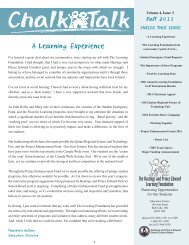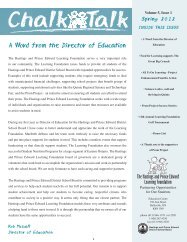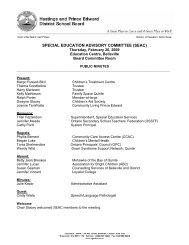Grade 11 Healthy Active Living Education Additional Supports ...
Grade 11 Healthy Active Living Education Additional Supports ...
Grade 11 Healthy Active Living Education Additional Supports ...
You also want an ePaper? Increase the reach of your titles
YUMPU automatically turns print PDFs into web optimized ePapers that Google loves.
Trust<br />
Trust is the foundation of a healthy relationship. One of the most destructive things in a<br />
relationship is jealousy that runs out of control. A certain degree of jealousy is a<br />
common element of a healthy relationship. However when jealousy enters a relationship<br />
it should be proportionate to the experience. There should be no lying, manipulation or<br />
secrets. There should be a sense of companionship and caring. There is always room for<br />
other friends with little fear that other friendships will minimize the dating relationship.<br />
Both parties will find they want to share themselves because they trust their partner to be<br />
as careful with their feelings as they are with their own. Trust levels and the degree to<br />
which a couple is willing to share their experiences takes time to develop. As the<br />
relationship grows, so should the level of trust. There is openness and both parties have<br />
good listening skills.<br />
Support<br />
Individuals in healthy relationships provide comfort and empathy to one another. They<br />
lend a shoulder and listen attentively to what their partner is saying, as well as the things<br />
they are not saying. There is no attempt to try to fix or change the other person. They<br />
accept one another for the person that they are (e.g., idiosyncrasies). Conflict is a normal<br />
part of any relationship. When conflict appears in a relationship, truly loving couples do<br />
not make attempts to lower their partnerÕs self-esteem. They care about each other and<br />
support them during good times and bad (e.g., career promotions, job loss, and family<br />
death). <strong>Healthy</strong> relationships are give and take situations, not one-way streets. Couples in<br />
healthy relationships are committed to bringing out the best in each other and have the<br />
otherÕs best interests at heart. Couples in healthy relationships recognize that there are<br />
shared responsibilities in career, leisure, child rearing, lifestyle choices and domestic<br />
duties.<br />
Easygoing<br />
The overall tone of the relationship is relaxed. Both parties can laugh at themselves<br />
without humour being at the other personÕs expense. Both parties will feel comfortable<br />
communicating their thoughts, feelings, likes, dislikes and ideas (e.g., where to go on a<br />
date, world issues, status of the relationship). <strong>Healthy</strong> relationships are void of physical<br />
aggression or threats of physical aggression. There is a sense of relaxation both when<br />
you are with your partner or apart.<br />
Fair Fighting<br />
Arguments, disagreements and issues are a part of every relationship. Conflict does not<br />
mean that the relationship has gone sour. In fact, healthy couples argue because:<br />
• they feel comfortable communicating their feelings and arenÕt afraid that the<br />
relationship will end with each argument<br />
• there is a sense of security because they know they can share their feelings openly<br />
• they care about one another and they do not want unresolved issues to remain<br />
unsolved<br />
<strong>Grade</strong> <strong>11</strong> <strong>Healthy</strong> <strong>Active</strong> <strong>Living</strong> <strong>Education</strong> (PPL30), Module #1 <strong>Healthy</strong> Relationships and Sexuality<br />
Page 36
















